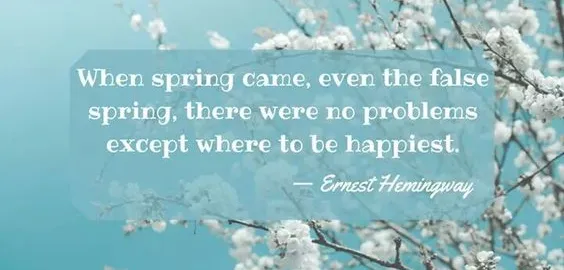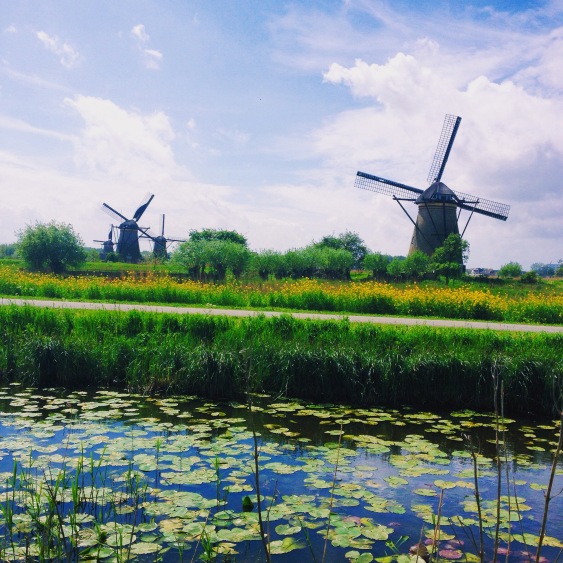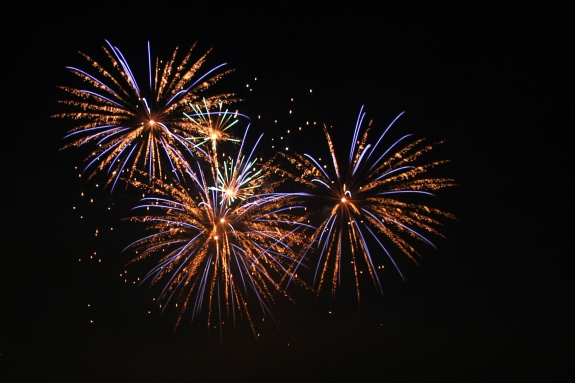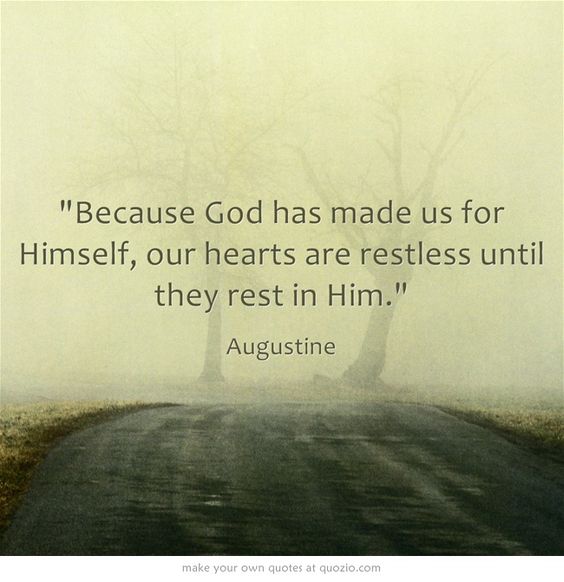
Searching, searching, searching.
This action of searching has become more and more prominent in my life and in the lives of people around me. Searching for the right school, searching for the right job, searching for the right group of friends, searching for a purpose, searching for their future husband or wife, searching for the right church, searching for excitement, searching for something new, searching for the truth, or merely searching for something entirely unknown.
As humans with a vast intellect, we have a beautiful desire to search. We have a need for knowledge that is unique to our species alone. We have the desire to find something better than what we have now—a way to improve our lives in order to live to the best of our ability. This desire is instilled in our skin, in our hearts, and in our soul; we all want to be the best version of ourselves and we all want to live our life to the fullest—we desire perfect happiness.
Because of this desire we are in a constant state of searching for whatever it is that will make us into that perfect version of ourself, but the question all of us ask in this stage is what is IT that we must find? We know the answer is out there; IT has to exist because we are not made to be inadequate. We are meant to be the best versions of ourselves, so there must be something that will help us achieve that goal. But what is IT?
This question has haunted mankind since the beginning. Adam and Eve thought IT was pure, unlimited knowledge. Socrates believed that true happiness came from a rational effort of harmonizing your body and soul by gaining complete control of your desires. Buddhists believe the path to your best version of yourself is by obtaining Nirvana—a state reached once you have disciplined your body, soul, and mind to no longer require or crave earthly things. Hindus believe perfect happiness comes from mediation and liberation of the soul from the body. The French philosopher John Locke believed true happiness came from satisfying your desires, particularity those desires that are intrinsically good for you as an individual. Aristotle said “he is happy who lives in accordance with complete virtue and is sufficiently equipped with external goods, not for some chance period but throughout a complete life” (Nicomachean Ethics).
In just those handful of great thinkers we have several ideas and theories about what happiness is and how to achieve it—they all believe that happiness, or the best version of yourself, is the end goal of the human earthly life, however with all the different ideas of how to obtain it, it’s not surprising that we are still stuck searching for the seemingly unobtainable desire.
This search begins at birth and, unfortunately for all of us, it has no end in sight. Since, however, everything has a beginning and end, we can easily conclude that there is an obtainable end. Furthermore, while we are all individuals, we are all members of the same species, the same form of rational, living, breathing human beings, body and soul, I believe we can only find PERFECT happiness the same thing.
Now, I say perfect happiness because I believe we all obtain imperfect, or temporary happiness in different ways. I feel incredibly happy sitting fourth row at a hockey game, while my best friend feels happy while watching The Bachelor. These are temporary cases of happiness, but that is not what we are talking about. I could go to 1,000 hockey games and I would still be searching the thing that calms my restless heart. My best friend could watch 1,000 episodes of The Bachelor, and this may make her temporarily happy (which I don’t understand, but that is another blog post in itself), but she will still feel that searching feeling in her heart, unless she has lodged her happiness in something more fundamental, more substantial, more true than something that only gives you 58 minutes of happiness—we, as humans, want more.
The reason I have been ruminating on this topic is because I recently re-read a poem that I completely adore. The poem is called “The Collar” written by George Herbert and it perfectly describes the searching I am talking about.
The Collar
By: George Herbert
I struck the board, and cried, “No more;
I will abroad!
What? shall I ever sigh and pine?
My lines and life are free, free as the road,
Loose as the wind, as large as store.
Shall I be still in suit?
Have I no harvest but a thorn
To let me blood, and not restore
What I have lost with cordial fruit?
Sure there was wine
Before my sighs did dry it; there was corn
Before my tears did drown it.
Is the year only lost to me?
Have I no bays to crown it,
No flowers, no garlands gay? All blasted?
All wasted?
Not so, my heart; but there is fruit,
And thou hast hands.
Recover all thy sigh-blown age
On double pleasures: leave thy cold dispute
Of what is fit and not. Forsake thy cage,
Thy rope of sands,
Which petty thoughts have made, and made to thee
Good cable, to enforce and draw,
And be thy law,
While thou didst wink and wouldst not see.
Away! take heed;
I will abroad.
Call in thy death’s-head there; tie up thy fears;
He that forbears
To suit and serve his need
Deserves his load.”
But as I raved and grew more fierce and wild
At every word,
Methought I heard one calling, Child!
And I replied My Lord.
Ah! This poem just speaks to my soul! Now, don’t worry if it didn’t speak to you right away, I had to read it 45 times and listen to a lecture about it until I finally understood the full meaning.
This poem follows a priest who doubts his work. He feels all of his work and his sacrifices have been for naught. He no longer feels the glories of all that he has done. When he was younger he saw first hand the fruits of his labor, but now, nothing. He finds there is no other option than to abandon his post; give up his searching and flee for an easier path.
As this poem progresses the narrator gets angrier and more despaired at his present circumstances. He is searching for joy he had before; the peace of being satisfied.
The crucial part of this poem comes in the last four lines:
But as I raved and grew more fierce and wild
At every word,
Methought I heard one calling, Child!
And I replied My Lord.
It’s amazing how quickly the poem turns here. He has line after line of rage and confusion and then here at the end all it took was one word from His Lord and all of that fear and anxiety disappears and he is at peace again.
This poem perfectly exemplifies the searching we all go through. We want to be recognized, to be worthy and useful, but nothing we do seems good enough because our hearts seek something not of this world.
“Because God has made us for Himself, our hearts are restless until they rest in him.”
St. Augustine is another perfect example of this searching. His whole life he searched for the physical happiness his heart desired, but that’s all he was doing, searching. Finally he stopped searching and he began to accept God in his life. He accepted the role and the path God wanted him to take and his search was over. No, he didn’t find ultimate happiness on earth, because, according to St. Thomas Aquinas, only imperfect happiness is attainable on earth, but he knew the perfect happiness was awaiting him at the end of the journey and he no longer needed to search for it here on earth.
You see, searching is not the answer. As humans we have the unfortunate habit of thinking we are the only ones who define our path. “We hold the keys to our destiny” or however the saying goes—I don’t really know because it’s a waste of time. The answer is acceptance and trust.
“Trust in the Lord with all your heart and lean not on your own understanding” Proverbs 3:5
So there are two things we have to do to obtain happiness: accept God to work in our lives, and trust his plan is the only plan that will truly make us the best version of ourselves. We have to abandon our endless search for the best end result we can imagine and accept that God’s end result is a bazillion times greater than anything our minds could come up with.
This obviously doesn’t mean just stop living and wait for God to set your life in motion; no, not at all, because God is a God of action. He wants to you follow his plan willingly, not lead you down the path with your hands tied. But he also wants you to be actively following him and actively trusting in his way.
I actually agree with Aristotle’s idea of earthly happiness, “he is happy who lives in accordance with complete virtue and is sufficiently equipped with external goods, not for some chance period but throughout a complete life.” I think it’s an imperfect happiness like Aquinas suggests, but I do agree that if we live in accordance with complete virtue we will be truly happy, because true virtue can lie only in accordance with God’s plan. One cannot be truly virtuous without God—it’s impossible.
The search we go on can be fruitful. It can help bring clarity and understanding. It wields knowledge and the yearning to discover the new and beautiful. Yet, even with the fruit the search brings, our hearts will continue to be restless until we rest in the peace of God. We will be restless until we stop the search and accept the beauty God has laid before our feet, all while whispering to us to follow Him.
“When I come to be united to thee with all my being, then there will be no more pain and toil for me, and my life shall be a real life, being wholly filled by thee.”
– Saint Augustine.
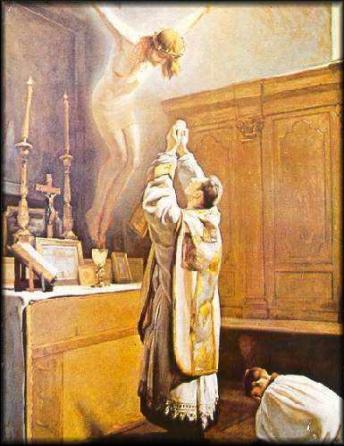 Though His sacrifice brought us salvation, it also brought Him from this world to heaven with his Father, and so for us, the majesty of our Lord is taken away, hidden once again from our eyes. However, God in His wisdom, knows his creation and knows we need the Lord forever in our presence, which is why Jesus’ final act on earth was to celebrate the first Mass with his disciples. This Mass was passed on through tradition and word from generation to generation so that all of God’s children be in the presence of Jesus Christ, our Lord.
Though His sacrifice brought us salvation, it also brought Him from this world to heaven with his Father, and so for us, the majesty of our Lord is taken away, hidden once again from our eyes. However, God in His wisdom, knows his creation and knows we need the Lord forever in our presence, which is why Jesus’ final act on earth was to celebrate the first Mass with his disciples. This Mass was passed on through tradition and word from generation to generation so that all of God’s children be in the presence of Jesus Christ, our Lord.

 The Carnelian Legacy by Cheryl Koevoet
The Carnelian Legacy by Cheryl Koevoet

